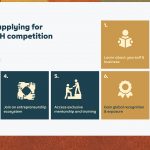We all have them. Those apps we open without thinking. Not because we need anything in particular, but because they feel… safe, in some…
This founder dreams of owning an eight-tonne crane truck

Recycling is big business. Just ask Rheineth Modiselle, the founder of Bokamoso Recycling, a Johannesburg-based waste management start-up, who dreams of owning an eight-tonne crane truck to help create a city that’s cleaner and healthier.
While Johannesburg ranks top in Africa for its financial services and GPD per capita, dumped waste has, unfortunately, become a constant eyesore on the streets of South Africa’s economic hub.
It is in this space that Modiselle’s start-up, Bokamoso Recycling, plays an increasingly important role in waste removal and management. Recently, she won a cash prize as the pitch-off winner at the inaugural WomHub Founder Showcase.
WomHub is a boutique Pan-African incubator, accelerator, and co-working hub for women founders in STEM start-ups. The showcase was presented by WomHub, the Finnish Embassy in South Africa as well as the economic growth accelerator powered by the South African Future Trust.
The closely contested competition was judged by Jozi Angels founder Abu Cassim, Caleo Capital associate partner Maya Burney, and Syson Kunda, founder of PingLady and PingAcademy.
Congratulations, Rheineth! One of the judges remarked that your start-up pitch was clear and provided all the key information they needed. How did you prepare and present your pitch so successfully?
It is important to have your notes and prepare mentally. When you are pitching, there are a lot of emotions going through you and if you’re not mentally prepared those emotions will automatically express themselves and be visible to your audience. It’s also important to ask the organisation hosting the pitch off for guidelines. Prior to the pitch, WomHub sent us guidelines on what our pitches would be scored on. I followed that guideline and included all the score points.
What inspired you to start Bokamoso Recycling?
I had just quit my job. I was unemployed and actively looking for opportunities. I came across a man crushing glass bottles and asked him what he was doing. We had a long conversation wherein he explained the difficulties he was facing. I had a solution for him and the glass recycler’s problems and that is how Bokamoso Recycling was born. The opportunity found me because I was also searching and ready for it.
Your mission to “repurpose glass to develop communities” is quite inspiring. What is your role in, and contribution to, the circular economy?
We purchase crushed glass from our recyclers and sell it to our partner buy-back centres – although soon we will be selling our glass directly to Consol, which is the largest manufacturer of glass in Southern Africa.
In doing this, we divert glass from ending up in the landfill. Glass repurposed provides sustainable incomes in the community and is good for the environment. To date we have diverted over 6 000 tonnes of glass from being landfilled.
The entrepreneurial journey can be challenging, as well as fulfilling. What have been the biggest challenges you’ve faced, and how have you overcome these?
The impact of the Covid-19 pandemic was the biggest challenge mentally, financially, and emotionally. Having to let go of staff and closing our doors for some months was hard. Learning to be resilient and agile were tools that allowed me to go back to the drawing board, re-evaluate my business strategy and find partners who would help me achieve this strategy.

In addition to winning the pitch off, how have you most benefitted from participating in WomHub’s circular economy incubator programme?
Having a community of likeminded businesswomen was helpful as we learnt, inspired, and leaned on each other. We had master classes which helped by equipping us with essential business tools, and mentors who were there to advise and guide us.
What is your big dream for growing your start-up, and how can people support you in achieving this?
I would love an eight-tonne crane truck. We are waiting for our vendor application with Consol to be approved, then we’ll be renting a truck for a few months until the bank can assist us with asset finance. This will allow us to reach and service even more glass recyclers, in addition to the over 200 glass recyclers we service.
And some fund-raising tips to encourage other start-up founders?
There are plenty of local and international organisations which are actively looking to help people start and grow businesses, in almost every sector, especially for young women. I encourage you to keep looking out for opportunities and don’t be afraid of knocking on those doors.
To assist entrepreneurs in preparing for future opportunities, Abu Cassim shared at the WomHub Founder Showcase that there are six things that an angel investor typically looks for: the idea, team (with reference to founder market-fit), market opportunity, traction, fit (in relation to a prospective investor’s focus and/or mandate), and return on investment.
Maya Burney explained the concept of “patient capital” – long-term capital in exchange for ownership in your business. She said when you’re thinking about fund raising, it’s important to consider the various types of capital that are out there.
For example, Womvest, which is a network of women investment professionals and entrepreneurs, has set up a ventures company called Womvest Ventures, which provides alternative types of capital. So, this is short-term capital that’s more flexible, as opposed to long term equity type capital.
ALSO READ: 50 entrepreneurs pitch at WomHub Founder Showcase

